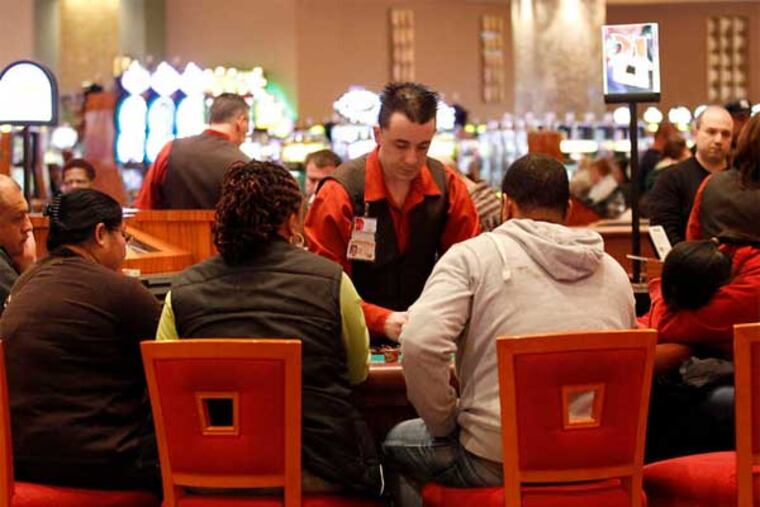Wall Street: Plenty of room for 2d Philly casino
Nearly 61/2 years after it wagered on casinos to create jobs and tax revenue, Pennsylvania continues to be among the strongest gaming markets in the country.

Nearly 6 1/2 years after it wagered on casinos to create jobs and tax revenue, Pennsylvania continues to be among the strongest gaming markets in the country.
And the view from Wall Street is that there is room for a second casino in Philadelphia, and that it will not have much more impact on Atlantic City than the four existing casinos around Philadelphia already have. Financing for mega-gambling palaces will be tight in the coming years, though.
Said John Maxwell, managing director of Jefferies & Co.: "You're going to see more casinos in New York . . . and possibly gambling in the Meadowlands. As far as Pennsylvania, we believe the market will continue to see strong growth. Demand exceeds supply here, and there is room for more supply."
Maxwell offered that perspective Tuesday at the Pennsylvania Gaming Congress at the Loews Philadelphia Hotel, where he was one of five Wall Street gaming analysts participating in a morning panel on the state and regional gambling landscape.
But "financing will get tougher, especially for the bigger projects, as states get greedier and open more casinos," said analyst John Kempf of RBC Capital Markets L.L.C.
Gaming in Pennsylvania has grown vigorously since the first casino - Mohegan Sun at Pocono Downs, near Wilkes-Barre - opened in November 2006. By mid-January of this year, Pennsylvania had knocked Atlantic City out of the No. 2 spot, slipping in behind Las Vegas among U.S. gaming markets based on gross gambling revenue in 2012.
"Pennsylvania has been the paragon of stability," said Jay Snowden, senior vice president of regional operations for Penn National Gaming Inc., one of the applicants for the second Philadelphia casino license. "The state has been the model."
Last year, Pennsylvania, with 11 operating casinos, took in $3.16 billion from slots and table games. Meanwhile, Atlantic City, which saw the $2.4 billion Revel open last April as its 12th casino, reported $3.05 billion.
Such explosive revenue growth was highlighted by Pennsylvania Revenue Secretary Dan Meuser in his keynote luncheon address.
"It's been widely reported that we are No. 2 behind Las Vegas in gross gaming revenue, but we are No. 1 in net tax revenue," Meuser said.
From 2006 to 2012, he said:
Gross gaming revenue shot up from $454 million to $3.1 billion.
State tax revenue rose from $250 million to $1.4 billion.
About $4.2 billion went toward statewide property-tax relief, and $1.4 billion toward the Race Horse Development Fund.
The economic-development and tourism fund got $618 million, and $445 million went to municipalities that host casinos.
Meuser added that $270 million from table-games revenue had gone to the state's general fund. The gaming industry employs more than 16,000 people.
But increased competition at Pennsylvania's borders, including from Ohio and Maryland, was the underlying theme. New laws and regulations are being passed or updated in Harrisburg to prevent the state from becoming complacent or falling behind.
New Jersey's approval in February of Internet gaming from servers housed at Atlantic City casinos poses a new technological threat. A Pennsylvania lawmaker introduced an online-gaming bill last month.
On Tuesday, the six groups vying for the city's second license gave 15-minute versions of their February presentations to the Pennsylvania Gaming Control Board.
The applicants are Market East Associates (Market8); PA Gaming Ventures L.L.C. (Hollywood Casino Philadelphia); PHL Local Gaming L.L.C. (Casino Revolution); Stadium Casino L.L.C. (Live! Hotel and Casino); Tower Entertainment L.L.C. (Provence); and Wynn PA Inc. (Wynn Philadelphia).
The gaming board is expected to take several months to make its final decision. Last week, there were hearings where individuals and community groups expressed concerns about parking, traffic, crime, and other issues that could affect the dynamics of a neighborhood should it land a casino.
A principal of PHL Gaming, which is proposing the $367 million Casino Revolution at Front Street and Pattison Avenue, was blunt about the area in which it plans to build.
"This is not the south of France or Las Vegas," Robert J. Borghese, vice president of corporate development for PHL Gaming, said, taking a jab at two rival plans - the Provence, proposed by developer Bart Blatstein for North Broad Street, and Wynn Philadelphia, proposed for Fishtown by gambling mogul Steve Wynn.
"This is South Philadelphia," Borghese said. "We're not trying to be something we're not."